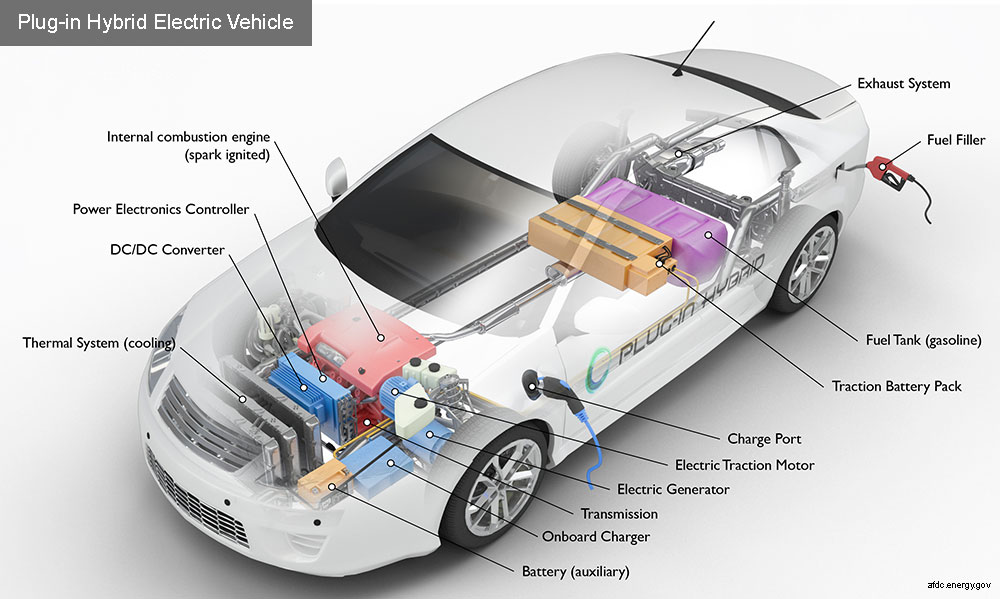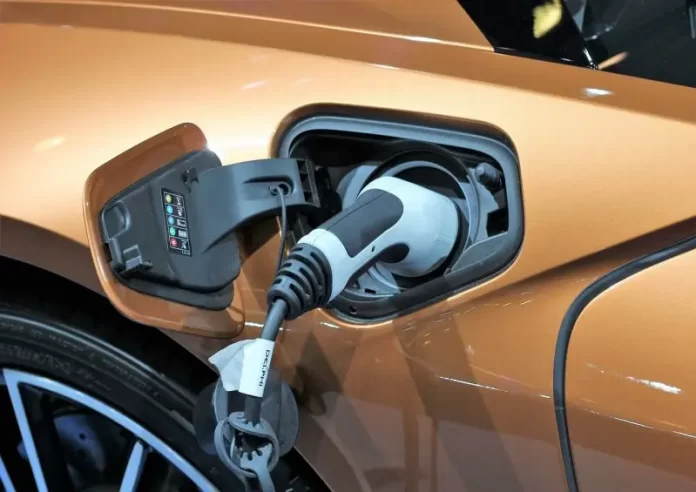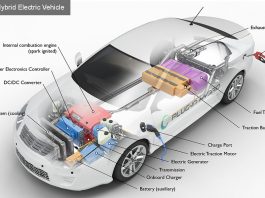Someone who is interested in owning an electric car but is hesitant to commit to purchasing a purely electric vehicle may benefit from a plug-in hybrid electric vehicle (PHEV).
Electric cars provide the advantage of zero emissions on shorter trips, but if you need to go longer distances, the convenience and speed of refueling with a petrol or diesel engine is preferable.
 TL: DR
TL: DR
Benefits of a PHEV:
- Cheap running costs
- No range anxiety on longer runs
Benefits of a Conventional Car:
- Better fuel efficiency on longer trips
Benefits of a Fully Electric Vehicle:
- Zero–emission motoring all the time
- Eligible for £1,500 government grant
How does a plug-in hybrid car work?
A PHEV is like a regular ‘self–charging’ hybrid car, but with a larger battery that can be plugged into an electric–car charger. This bigger battery gives the PHEV an electric–only range of around 20 to 30 miles, although some models can travel up to 50 miles.
When you need a boost, the engine will recharge the battery slightly. To get the most out of your PHEV, you should plug it into a charging point. You can use a standard 3–pin plug or install a fast charger at your home.

What are the pros and cons of owning a plug–in hybrid vehicle?
Before purchasing a PHEV, it is important to take into account several factors.
Advantages of a plug-in hybrid:
- By choosing a PHEV, you can take advantage of reduced tax rates. Depending on the car‘s emissions, the first year of taxation could cost you anywhere between £0 and £105, with a yearly rate of £145 following that. Additionally, you can benefit from a decreased rate of company car tax.
- The range anxiety that can be experienced with fully electric cars is eliminated with the use of a PHEV because the petrol or diesel engine serves as a backup once the battery has been depleted. This means that trips of greater distance can be undertaken without worrying about being left stranded without access to charging.
- The biggest benefit of having a PHEV is its greater electric–only range when compared to a regular hybrid. For many people, having a range between 20 to 30 miles is enough for their daily travels, so as long as there is a charger available at home, the internal combustion engine will not have to be used very often.
Disadvantages of a plug-in hybrid:
- Plug–in hybrids are typically costlier to purchase than a non–hybrid vehicle, particularly since they are no longer eligible for the plug–in car grant.
- If you drive a lot, PHEVs may be less fuel–efficient than normal petrol or diesel cars because of the heavier battery weight. Some cars attempt to counter this by having a smaller gas tank, which only results in you having to fill up more frequently.
- If you want to be able to take full advantage of the EV range on a daily basis, you must have access to either a mains supply or a charging point that can be used during the night. Even though the UK‘s charging network is becoming extensive, it may still be difficult to locate a charger if you do not have the benefit of off–street parking.
Which plug–in hybrid cars are the most highly rated?

| Mercedes C 300 e | 65-68 miles | 403.6-470.8mpg/14-15g/km | 4.5/5 | £44,895 |
| Skoda Octavia iV | 34 miles | 217.3-282.5mpg/22-30g/km | 4/5 | £28,400-£38,520 |
| Renault Captur E-Tech PHEV | 31 miles | 188.3mpg/34-35g/km | 3.5/5 | £31,195-£32,695 |
| BMW X5 xDrive45e | 51-54 miles | 201.8-235.4mpg/27-31g/km | 3/5 | £71,310 |
| BMW 545e | 29-34 miles | 128.4-166.2mpg/39-51g/km | 4.5/5 | £57,965-£61,465 |
| Mercedes E 300 e and E 300 de | 31-35 miles | 176.6-217.3mpg/33-36g/km | 4/5 | £46,230-£58,290 |
| BMW 330e | 34-37 miles | 176.6-217.3mpg/30-38g/km | 4.5/5 | £41,330-£48,185 |
| Volvo XC60 Recharge | 28-32 miles | 100.9-282.1mpg/23-64g/km | 4/5 | £53,225-£64,480 |
| Hyundai Ioniq Plug-in | 39 miles | 256.8mpg/26g/km | 4/5 | £30,450-£32,450 |
| Ford Kuga PHEV | 35 miles | 201.8mpg/32g/km | 3.5/5 | £36,905-£39,305 |
Read also what are the 4 main types of electric vehicles and why at some point we all should make the shit.
Is investing in a plug–in hybrid worth it?
What type of car you should get really depends on the majority of your journeys and what you need the car for. PHEVs are great if your round trips are usually less than 40 miles but you need to do the occasional long–distance drive, while a conventional petrol– or diesel–powered car is better for longer journeys. If you‘re mainly doing shorter trips, an electric car could be the best option as you‘d benefit from zero–emission motoring and may qualify for a government grant.



